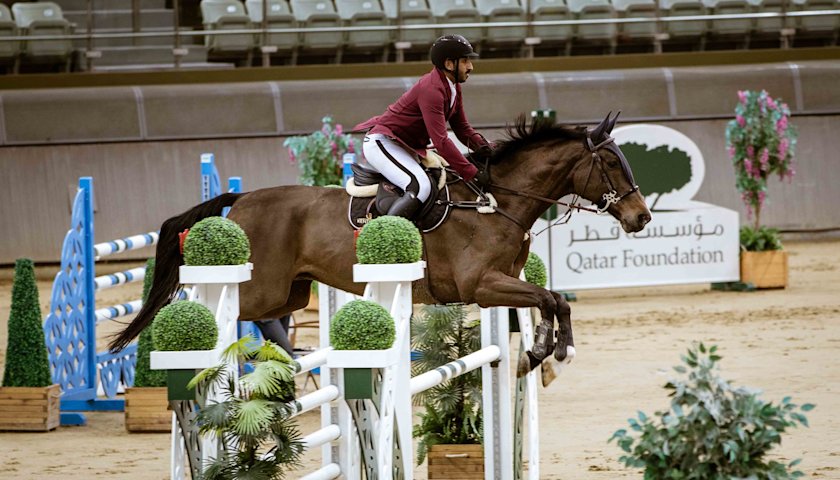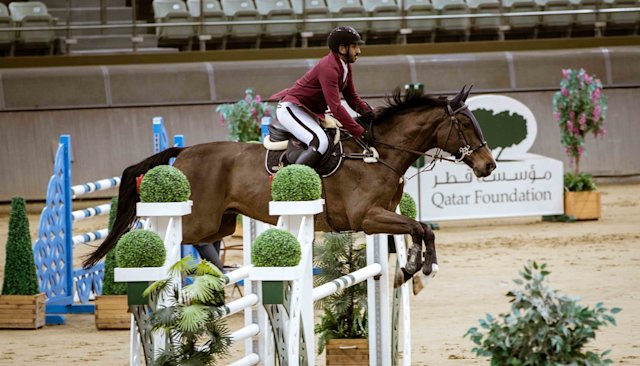Innovation, Empowerment, And Insight
As a year that would prove to be like no other dawned, for Qatar Foundation (QF) the arrival of 2020 marked a quarter of a century of unlocking human potential.
In the 25 years since its founding in 1995, QF has built a sweeping, integrated, and constantly-evolving ecosystem of education, science and research, and community development – dedicated to cultivating the leaders and change-makers of the future, generating solutions to the greatest challenges facing Qatar and the world, and empowering people throughout Qatar’s community to live healthy and sustainable lives, and become active, engaged players in society.
As a year that would prove to be like no other dawned, for Qatar Foundation (QF) the arrival of 2020 marked a quarter of a century of unlocking human potential.
In the 25 years since its founding in 1995, QF has built a sweeping, integrated, and constantly-evolving ecosystem of education, science and research, and community development – dedicated to cultivating the leaders and change-makers of the future, generating solutions to the greatest challenges facing Qatar and the world, and empowering people throughout Qatar’s community to live healthy and sustainable lives, and become active, engaged players in society.
Through QF, the youth of Qatar, the region, and the world enjoyed a unique tech entrepreneurship experience; replicated the United Nations; and had their say on how their education prepares them for the future.
From idea to reality
It is an ecosystem of ideas, and January showcased how QF provides opportunities for young people within Qatar, across the region, and throughout the world to turn those ideas into reality as the third Arab Innovation Academy (AIA) unfolded at Qatar Science & Technology Park (QSTP).
The pan-Arab region’s first, and largest, entrepreneurship program, the AIA – created by QSTP and the European Innovation Academy – brings aspiring ‘techpreneurs’ from different countries and backgrounds together in Doha, challenging them to turn their ideas into a startup in just 10 days within an environment that mirrors the real world of tech innovation.
Its latest instalment drew 190 applicants of 30 nationalities, half of whom were Qataris, with Salamtak – an online system for managing chronic diseases – emerging as the winner. Its Chief Business Officer Muhammad Al Mukdad, a Syrian living in Qatar, summed it up by saying: “I feel amazing – it has been 10 challenging days, but a great experience with wonderful people from around the world.”
It is an ecosystem of ideas, and January showcased how QF provides opportunities for young people within Qatar, across the region, and throughout the world to turn those ideas into reality as the third Arab Innovation Academy (AIA) unfolded at Qatar Science & Technology Park (QSTP).
The pan-Arab region’s first, and largest, entrepreneurship program, the AIA – created by QSTP and the European Innovation Academy – brings aspiring ‘techpreneurs’ from different countries and backgrounds together in Doha, challenging them to turn their ideas into a startup in just 10 days within an environment that mirrors the real world of tech innovation.
Its latest instalment drew 190 applicants of 30 nationalities, half of whom were Qataris, with Salamtak – an online system for managing chronic diseases – emerging as the winner. Its Chief Business Officer Muhammad Al Mukdad, a Syrian living in Qatar, summed it up by saying: “I feel amazing – it has been 10 challenging days, but a great experience with wonderful people from around the world.”
I feel amazing – it has been 10 challenging days, but a great experience with wonderful people from around the world.
Arab Innovation Academy 2020
- 190 participants
- 30+ nationalities
- 50% of participants Qatari
- Almost 800 applications
A global conversation
From the ideas of youth to the voices of youth, the ninth annual THIMUN Qatar Conference gave high school students from the Middle East, Asia, Africa, and Europe the opportunity to bring their perspectives to global conversations.
Organized by the THIMUN Qatar Regional Office – which comes under QF’s Pre-University Education (PUE) and was created as a joint project with the THIMUN Foundation – the conference sees young people aged 14-18 share ideas and experiences, address key international issues, and participate in sessions that replicate United Nations committees.
Its 2020 edition carried the theme of Good Health and Wellbeing, with Hannah Kollen, President of the THIMUN Qatar General Assembly, telling more than 1,900 people from 14 countries: “We may not be policymakers, entrepreneurs, or scientists yet, but we are demanding that we be taken seriously now.
“’Leaders of tomorrow’ is a phrase used to address high school students over and over, but why can’t we be the leaders of today?”
From the ideas of youth to the voices of youth, the ninth annual THIMUN Qatar Conference gave high school students from the Middle East, Asia, Africa, and Europe the opportunity to bring their perspectives to global conversations.
Organized by the THIMUN Qatar Regional Office – which comes under QF’s Pre-University Education (PUE) and was created as a joint project with the THIMUN Foundation – the conference sees young people aged 14-18 share ideas and experiences, address key international issues, and participate in sessions that replicate United Nations committees.
Its 2020 edition carried the theme of Good Health and Wellbeing, with Hannah Kollen, President of the THIMUN Qatar General Assembly, telling more than 1,900 people from 14 countries: “We may not be policymakers, entrepreneurs, or scientists yet, but we are demanding that we be taken seriously now.
“’Leaders of tomorrow’ is a phrase used to address high school students over and over, but why can’t we be the leaders of today?”
Leaders of tomorrow’ is a phrase used to address high school students over and over, but why can’t we be the leaders of today?
THIMUN Qatar Conference 2020
- 1,900+ participants
- 14 countries
- 17 simulations of UN forums
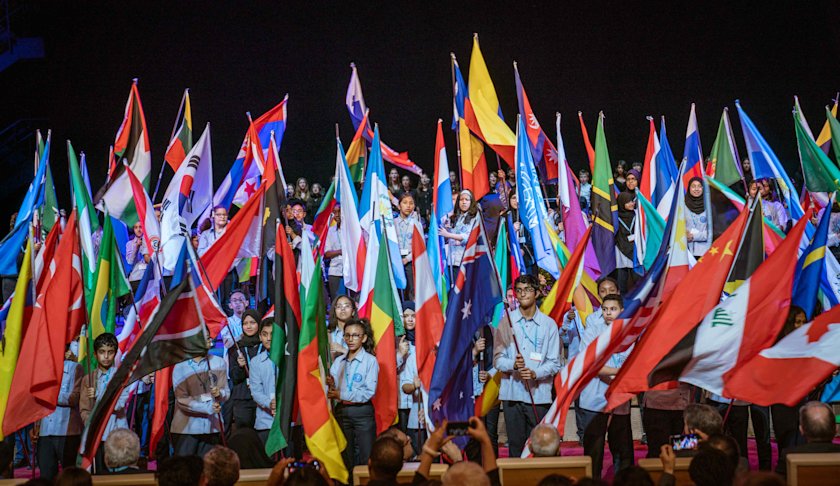
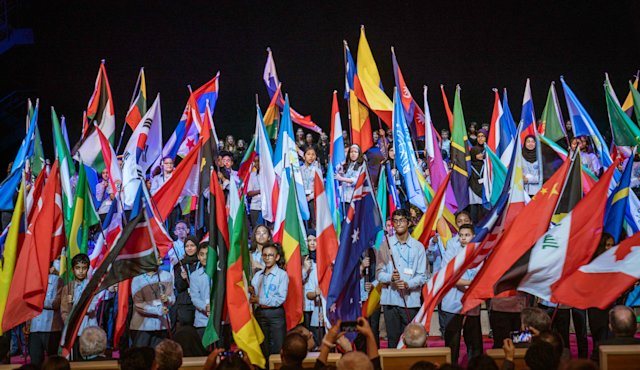
Knowledge and talent
Leading the way in the global education arena less than two years after its opening was Qatar Academy for Science and Technology (QAST), as the QF school – which specializes in STEM education – claimed the Teaching and Learning Initiative prize at the International Schools Award 2020 for its unique curriculum called CRISP: Collaborate, Research, Innovate, Synthesize, and Present
At QAST, students are set challenges that reflect those the world presents, work in teams to solve them, and then present their solutions to key stakeholders. The aim is to encourage them to blend academic knowledge and practical talent to tackle issues that exist in the world beyond the classroom from their first day at the school, with the school’s director, Dr. Gregory Moncada, saying: “I am delighted that our approach to empowering our students with the knowledge and skills they need to find solutions to the challenges we all face has been recognized so soon in our development.”
Leading the way in the global education arena less than two years after its opening was Qatar Academy for Science and Technology (QAST), as the QF school – which specializes in STEM education – claimed the Teaching and Learning Initiative prize at the International Schools Award 2020 for its unique curriculum called CRISP: Collaborate, Research, Innovate, Synthesize, and Present
At QAST, students are set challenges that reflect those the world presents, work in teams to solve them, and then present their solutions to key stakeholders. The aim is to encourage them to blend academic knowledge and practical talent to tackle issues that exist in the world beyond the classroom from their first day at the school, with the school’s director, Dr. Gregory Moncada, saying: “I am delighted that our approach to empowering our students with the knowledge and skills they need to find solutions to the challenges we all face has been recognized so soon in our development.”
I am delighted that our approach to empowering our students with the knowledge and skills they need to find solutions to the challenges we all face has been recognized so soon in our development.
In the 2019-20 academic year, QAST had:
- 30 students of 10 nationalities
- 9 teachers
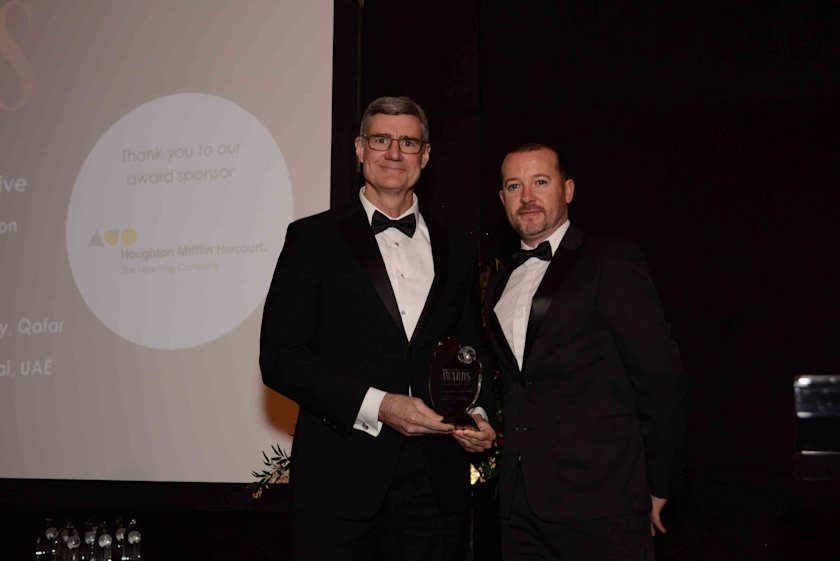
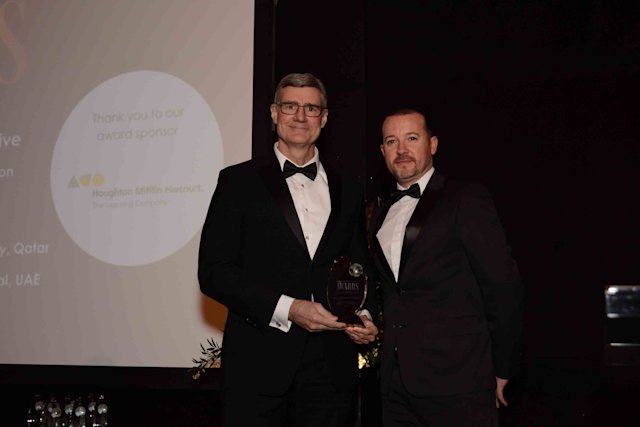
Debating at Davos
Addressing and solving challenges demands critical thinking, which is what QF’s QatarDebate nurtures among the thousands of young people who participate in its debating programs. In January, its commitment to promoting the art and the value of debate and discourse was illustrated at Davos, on the sidelines of the World Economic Forum’s 50th Annual Meeting.
A QatarDebate-sponsored event saw six international speakers face off to argue whether ‘big tech’ can be allowed to self-regulate, or if its power has to be curbed by a new watchdog – with the audience vote coming down in favor of the latter motion. “The truth is that we need to think very carefully about how we manage and regulate technology to benefit us, and what kind of critical thinking skills we need to navigate the world of technology,” said Abdulrahman Al-Subaie, QatarDebate’s Head of Outreach Programs.
Addressing and solving challenges demands critical thinking, which is what QF’s QatarDebate nurtures among the thousands of young people who participate in its debating programs. In January, its commitment to promoting the art and the value of debate and discourse was illustrated at Davos, on the sidelines of the World Economic Forum’s 50th Annual Meeting.
A QatarDebate-sponsored event saw six international speakers face off to argue whether ‘big tech’ can be allowed to self-regulate, or if its power has to be curbed by a new watchdog – with the audience vote coming down in favor of the latter motion. “The truth is that we need to think very carefully about how we manage and regulate technology to benefit us, and what kind of critical thinking skills we need to navigate the world of technology,” said Abdulrahman Al-Subaie, QatarDebate’s Head of Outreach Programs.
Connecting cultures
Music from QF’s Qatar Philharmonic Orchestra launched the Qatar-France Year of Culture 2020, the latest edition of a cultural exchange program run by Qatar Museums to promote the nation globally, and strengthen ties that stretch across continents.
The opening concert in January took place at Katara Opera House, where the multinational orchestra performed pieces by Qatari and French composers – the first in a series of events, supported by QF, allowing experiences to be shared, friendships formed, and cross-cultural connections made.
“Qatar Foundation believes that cultural exchange is vital to us learning both about others, and about ourselves,” said Hend Al-Mousawi, Head of Arts, Culture and Heritage Programming at QF. “It broadens our perspectives, develops our understanding of the world, encourages us to recognize what unites us while also celebrating what makes us different and unique, and acts as a channel for dialogue and interaction.”
Music from QF’s Qatar Philharmonic Orchestra launched the Qatar-France Year of Culture 2020, the latest edition of a cultural exchange program run by Qatar Museums to promote the nation globally, and strengthen ties that stretch across continents.
The opening concert in January took place at Katara Opera House, where the multinational orchestra performed pieces by Qatari and French composers – the first in a series of events, supported by QF, allowing experiences to be shared, friendships formed, and cross-cultural connections made.
“Qatar Foundation believes that cultural exchange is vital to us learning both about others, and about ourselves,” said Hend Al-Mousawi, Head of Arts, Culture and Heritage Programming at QF. “It broadens our perspectives, develops our understanding of the world, encourages us to recognize what unites us while also celebrating what makes us different and unique, and acts as a channel for dialogue and interaction.”
Qatar Foundation believes that cultural exchange is vital to us learning both about others, and about ourselves.
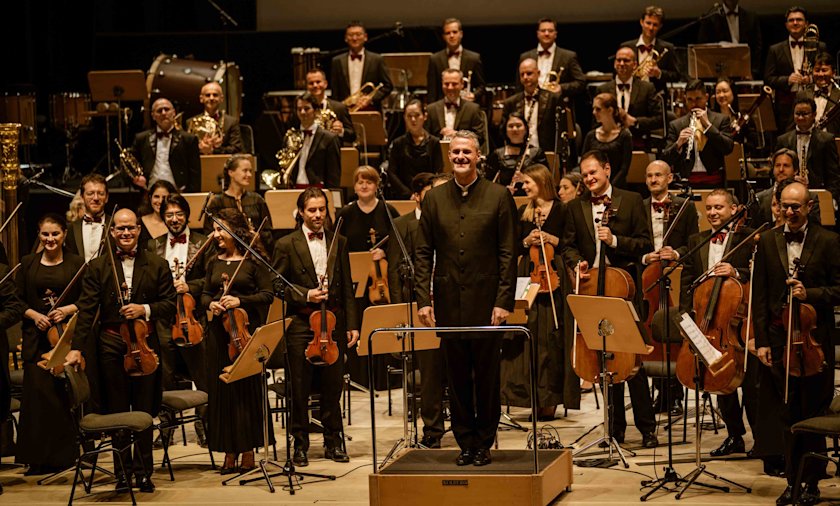
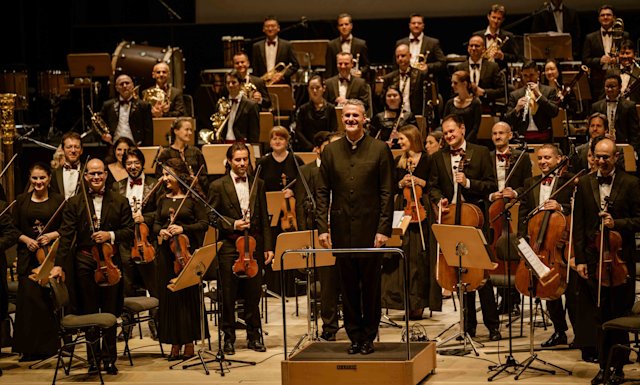
Education through the eyes of youth
January also marked the International Day of Education, and QF’s World Innovation Summit for Education (WISE) used the occasion to unveil new research into what the world’s youth think about their education, and how prepared they feel they are to face the future.
The Global Education Barometer revealed most young people believe their generation has the responsibility for changing the world, but less than half believe they have the opportunity and tools to do it. Its key findings have been included in work conducted by UNESCO initiatives.
“We’re all well aware of the rapid changes on the horizon that will radically shift the world we live in,” said Elyas Felfoul, Director of Policy Development and Partnerships at WISE. “How can the main institutions help to create an education system that adapts to these radical changes?
“We need to create a new roadmap, to make it easier for the next generation to join this effort, so that once they’re ready to lead, they’re going to feel well-equipped.”
January also marked the International Day of Education, and QF’s World Innovation Summit for Education (WISE) used the occasion to unveil new research into what the world’s youth think about their education, and how prepared they feel they are to face the future.
The Global Education Barometer revealed most young people believe their generation has the responsibility for changing the world, but less than half believe they have the opportunity and tools to do it. Its key findings have been included in work conducted by UNESCO initiatives.
“We’re all well aware of the rapid changes on the horizon that will radically shift the world we live in,” said Elyas Felfoul, Director of Policy Development and Partnerships at WISE. “How can the main institutions help to create an education system that adapts to these radical changes?
“We need to create a new roadmap, to make it easier for the next generation to join this effort, so that once they’re ready to lead, they’re going to feel well-equipped.”
We need to create a new roadmap, to make it easier for the next generation to join this effort, so that once they’re ready to lead, they’re going to feel well-equipped
WISE Global Education Barometer
- 9,509 young people from 20 countries surveyed
- 87% say youth have a responsibility to improve the planet
- 85% have fears about the state of the world
- 80% satisfied with their education
- But only 27% fully satisfied
- 50% do not feel ready to take action to improve the world
- Only 48% feel prepared to understand big issues
- 90% say education is about more than learning for a career
- 84% say learning outside school is as important as learning in school
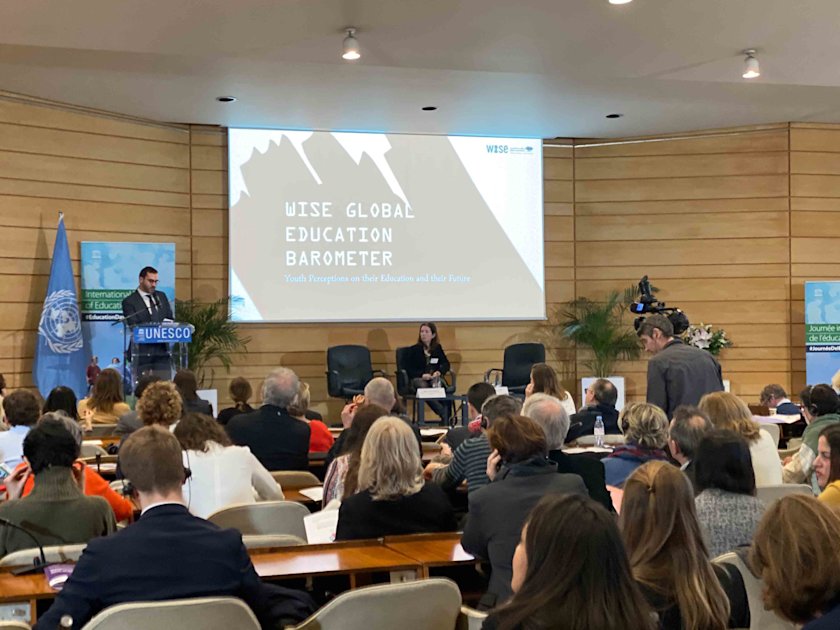
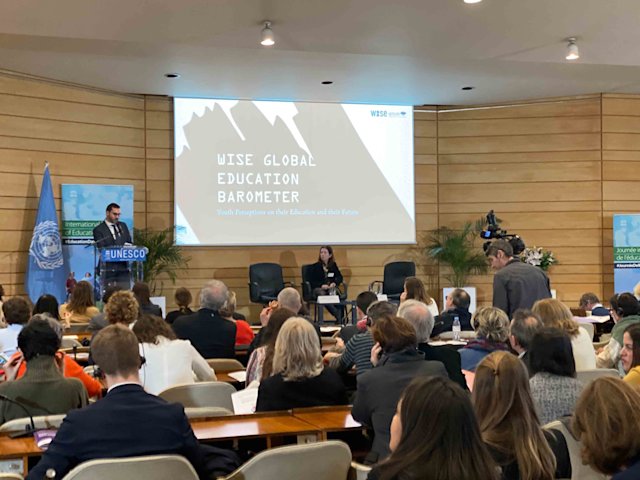
Life-changing support
Equipping talented students with the support that allows them to overcome potential hurdles standing in their path to a quality education reflects QF’s commitment to educational inclusivity. The organization offers a range of financial aid packages to young people throughout the world whose potential to excel could otherwise be stymied by cost concerns, enabling them to continue their studies at QF’s world-class universities.
In January, its latest batch of scholarships were awarded during a ceremony at Education City, with one of the recipients being Ahmed Mahfouz. A student at QF partner university Texas A&M University at Qatar, he encapsulated what QF’s financial support means by saying: “I do not exaggerate when I say that this changed my entire life.”
Equipping talented students with the support that allows them to overcome potential hurdles standing in their path to a quality education reflects QF’s commitment to educational inclusivity. The organization offers a range of financial aid packages to young people throughout the world whose potential to excel could otherwise be stymied by cost concerns, enabling them to continue their studies at QF’s world-class universities.
In January, its latest batch of scholarships were awarded during a ceremony at Education City, with one of the recipients being Ahmed Mahfouz. A student at QF partner university Texas A&M University at Qatar, he encapsulated what QF’s financial support means by saying: “I do not exaggerate when I say that this changed my entire life.”
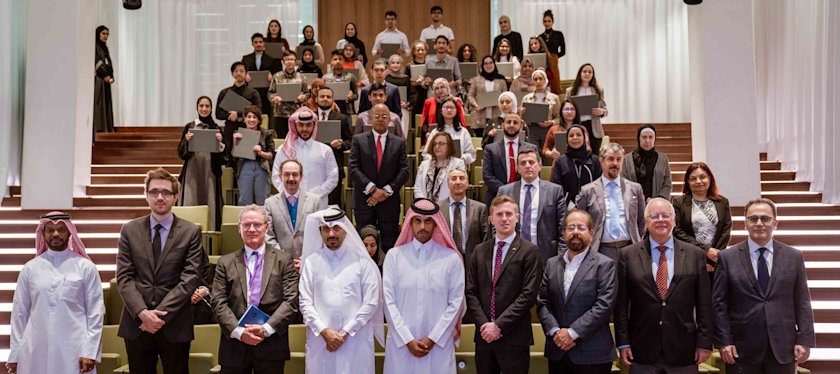
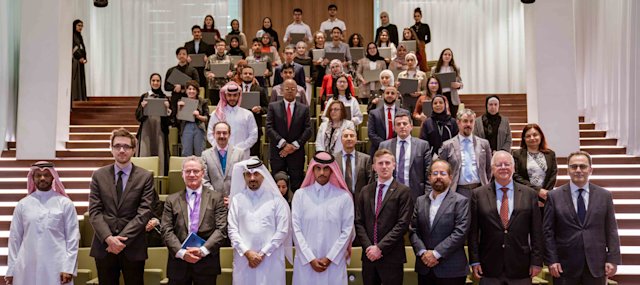
Learning and dialogue
Another QF partner university, Virginia Commonwealth University School of the Arts in Qatar, opened up an opportunity to learn that is the only one of its kind in the region, as it launched its new Foundation in Art Therapy program, led by a member of its Class of 2006, Sara Powell.
Meanwhile, Northwestern University in Qatar - a fellow international university housed at Education City - welcomed scholars and professionals from around the world for a conference focusing on The Digital Transformation of Sport Media.
“Media and sports are two essential industries in Qatar’s transition toward a post-fossil fuel future, and they seek to shift the narrative of sport history from one that is overwhelmingly based on Western sources,” said Craig LaMay, the university’s acting dean.
Another QF partner university, Virginia Commonwealth University School of the Arts in Qatar, opened up an opportunity to learn that is the only one of its kind in the region, as it launched its new Foundation in Art Therapy program, led by a member of its Class of 2006, Sara Powell.
Meanwhile, Northwestern University in Qatar - a fellow international university housed at Education City - welcomed scholars and professionals from around the world for a conference focusing on The Digital Transformation of Sport Media.
“Media and sports are two essential industries in Qatar’s transition toward a post-fossil fuel future, and they seek to shift the narrative of sport history from one that is overwhelmingly based on Western sources,” said Craig LaMay, the university’s acting dean.
5 Undergraduate programs and 1 Master’s program are offered by Virginia Commonwealth University School of the Arts in Qatar
6 Northwestern University in Qatar offers undergraduate programs
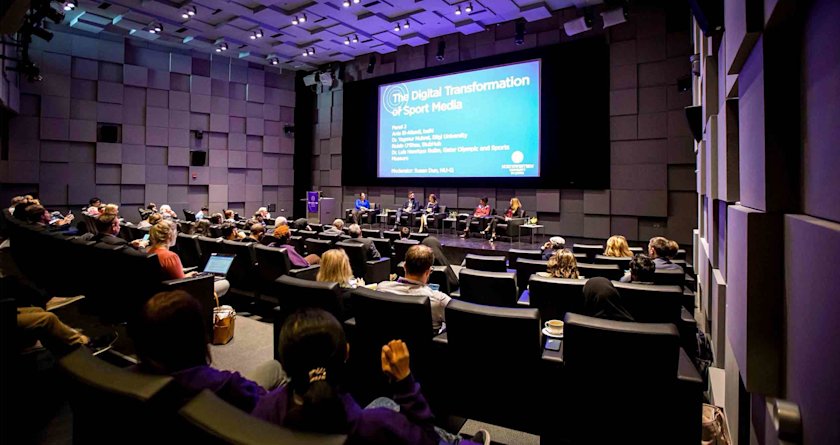
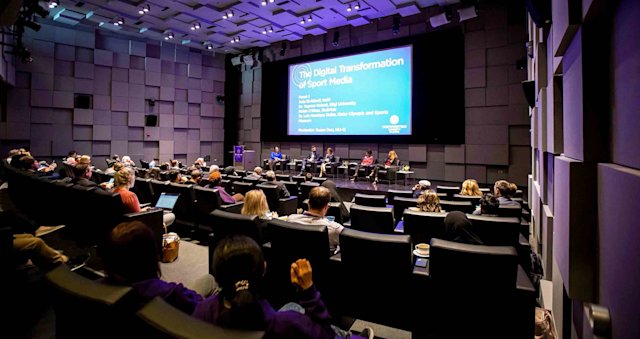
From horsemanship to healthcare
On QF’s sporting front, a new competition designed to pave the way for Qatar’s future equestrian champions to emerge saw horse-riding stars of the future shine at Al Shaqab in January. Around 300 riders, from children to those experienced in horsemanship, participated as the equine and equestrian center – which preserves and promotes the proud legacy of the Arabian horse breed – staged its inaugural Showjumping Competition.
And QF member Sidra Medicine ushered in the year by announcing a raft of new women’s services to be introduced in 2020, designed to advance women’s health in Qatar. The expansion of services offered by the groundbreaking women’s and children’s hospital included a state-of-the-art IVF facility, a Women’s Adult Pain Clinic, and the continuation of Sidra’s technological advances in minimally invasive gynecology surgery.
As Dr. Aisha Yousuf, Sidra Medicine’s Medical Director of Reproductive Surgery, said: “We are constantly pushing the boundaries of what it takes to be a pioneering hospital.”
On QF’s sporting front, a new competition designed to pave the way for Qatar’s future equestrian champions to emerge saw horse-riding stars of the future shine at Al Shaqab in January. Around 300 riders, from children to those experienced in horsemanship, participated as the equine and equestrian center – which preserves and promotes the proud legacy of the Arabian horse breed – staged its inaugural Showjumping Competition.
And QF member Sidra Medicine ushered in the year by announcing a raft of new women’s services to be introduced in 2020, designed to advance women’s health in Qatar. The expansion of services offered by the groundbreaking women’s and children’s hospital included a state-of-the-art IVF facility, a Women’s Adult Pain Clinic, and the continuation of Sidra’s technological advances in minimally invasive gynecology surgery.
As Dr. Aisha Yousuf, Sidra Medicine’s Medical Director of Reproductive Surgery, said: “We are constantly pushing the boundaries of what it takes to be a pioneering hospital.”
We are constantly pushing the boundaries of what it takes to be a pioneering hospital
300 Riders participated in Al Shaqab’s inaugural Showjumping Competition
